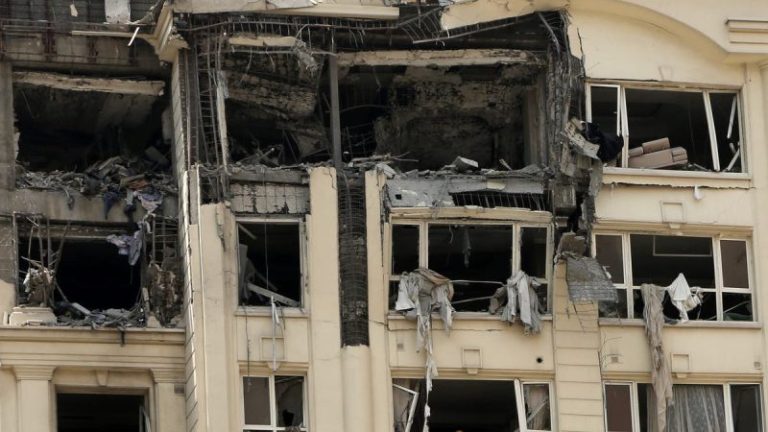Iran has initiated a forceful counterattack on Tel Aviv, just as the dust had begun to settle on Israel’s first round of strikes on Tehran, an operation to wipe out the Iranian regime’s nuclear capabilities.
Tel Aviv residents were instructed to remain in bomb shelters Friday evening until further notice as the Israeli Defense Forces intercepted an onslaught of missile attacks from Tehran.
The U.S. is left to wonder whether it will be drawn into the conflict. Secretary of State Marco Rubio at first insisted the American government was not involved in the strikes, but President Donald Trump’s comments Friday suggest he didn’t oppose them.
Iran claimed that Israel’s ‘aggression against Iran could not have been carried out without the coordination and approval of the United States.’
If Iran is acting rationally, it has no reason to provoke America into joining offensive attacks on behalf of its ally Israel.
But what if it isn’t?
‘I hope and pray the Iranians don’t hit Americans but … it’s going to be very hard for the regime to not hit back and not hit back big,’ one former Pentagon official said. ‘All indications are they feel like they’re going to have to hit back hard.’
Another analyst echoed that point but emphasized the emotional toll on Iran’s leadership.
‘You’re talking about human beings who just watched their country get attacked, and a lot of their close advisors, confidants, probably friends get killed, right?’ said Rosemary Kelanic, director of the Middle East Program at Defense Priorities. ‘That’s a tough thing for Iran to actually muster to do, but that’s clearly the right move for them strategically.’
Iranians haven’t been afraid to attack the U.S. before: they tried to kill Trump and his former advisors Mike Pompeo and John Bolton over the Qassem Soleimani assassination for years.
Iran’s ability to strike U.S. targets in the region is no secret: It has missiles and drones capable of reaching American bases in Iraq, Syria and the Gulf. And, as Gregg Roman, executive director of the Middle East Forum, noted, it has already demonstrated a willingness to use them.
‘Iran has the ability to use its missile program and its drones to strike at the United States and its bases in the region and in Israel,’ Roman said. ‘It has threatened to do so.’
But a bigger concern is sleeper cells – Iran’s ability to operate through proxies even within the U.S.
‘That’s what I’m most worried about,’ said Roman.
‘Iran has demonstrated… that it has the capability to establish infrastructure here in the United States,’ said Joe Truzman, senior research analyst with FDD’s Long War Journal. ‘Whether that’s through agents they hire, a proxy force like Hezbollah, or sleeper agents… it’s definitely a possibility.’
A former Pentagon official pointed to Iran’s massive missile arsenal – including more cruise and ballistic missiles than the U.S. has interceptors globally.
‘If Iran really decides to throw in its missile force, … they could really do a lot of damage,’ one former official said. ‘Particularly in Iraq and Syria, where a lot of our smaller bases are not well defended … not covered by Patriots or THAADs.’
Iran has a chokehold on Iraq’s Shiite military forces: They are the regime’s strongest proxy at the moment. The U.S. has around 2,000 forces stationed in Iraq to fight terrorism and this week evacuated non-essential embassy staff and their families from the embassy there.
‘Iran may choose to direct its proxy forces in Iraq or Yemen to begin increasing pressure on the U.S. by attacking American targets,’ said Truzman, ‘to build up enough pressure to compel the U.S. to stop carrying out attacks.’
For now, Iran appears to be aiming its retaliation primarily at Israel – not the U.S. ‘Right now, most of Iran’s violent rhetoric and their attention is on attacking Israeli targets,’ said Truzman. ‘At this point, I don’t think Iran wants to provoke the U.S.’
Still, the situation remains fluid. ‘A lot depends on how Iran perceives the United States’ involvement in this conflict right now,’ he added. ‘The longer this conflict drags on, it’s very likely the U.S. military will get more involved.’
Beni Sabti, Iran expert at the Institute for National Security Studies, said that right now, ‘it’s convenient for Israel, Iran and for the U.S. for Iran to leave the U.S. alone.’
Kelanic warned that Israel may have made a grave miscalculation. ‘I think this is a huge strategic mistake by Israel,’ she said. ‘I’m worried they’re going to drag the United States into this giant mess.’
The U.S. is all but guaranteed to get involved at least in a defensive posture to help Israel repel Iran’s countermoves, and Ayatollah Alli Khamenei has vowed to bring Israel ‘to its knees.’ The U.S. coordinated closely with Israel to fend off Iran’s last two counterattacks in April and October last year.
‘The Zionist regime will not escape unscathed from this crime,’ Khamenei threatened in a televised address on Friday.

